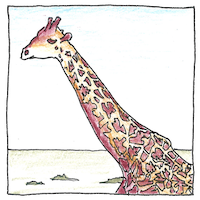Jean-Baptiste Lamarck
evolution

|
Acquired characteristics
Jean-Baptiste Pierre Antoine de Monet, Chevalier de la Marck.
Soft heredity
Naturalists including Lamarck naturally assumed that animals passed to their offspring characteristics that they acquired during their lives but Lamarck also believed that this explained evolutionary change. Lamarck taught that animals have a quality called besoin thought of as “want” or “need.” Generation after generation of animals gradually developed their abilities according to their besoin.
Besoin
The need of the giraffe to graze on leaves at the tops of trees gradually created its long neck. The need of the rabbit to hop gradually developed its bigger haunches. The need of the hawk to eat the rabbit gradually grew its fast wings and sharp claws. The need of the socialite to snub her inferiors gradually turned up the noses of her well-off offspring. Over time, these things have improved our world to where we now live more satisfied and more sophisticated.



Lamarck’s name itself, showing his Christian, French, and aristocratic heritage, is symbolic of acquired characteristics, which is ironic because we know that genetic characteristics of children are not acquired by their parents during their lives.
Using the development of a giraffe’s neck as an example of besoin is ironic in light of the reason that Lamarck had to leave the French army. Seventeen years old, having shown bravery and leadership under fire in the Pomeranian War, he was promoted on the spot to the rank of officer, whereupon one of his comrades “playfully lifted him by the head,” causing inflamation of the lymph nodes and a complicated and lengthy treatment.
Lamarck contributed to our theory of evolution two ideas that are true:
Lamarck was one of the first to realize that evolution is governed by natural laws, and his work gave us the first cohesive theory of evolution.
Darwin’s concept of “survival of the fittest” has eclipsed Lamarck’s concept of besoin. Natural selection works without wants or needs; evolution is purely a materialistic game of chance. Considered merely as a description of evolutionary change, besoin is appealing. It is appealing to consider a specie’s needs over time in its successful adaption to a changing environment and competition. However, besoin is romantic and ignores the fact that evolutionary change doesn’t have a moral cause, that it does not achieve progress toward a higher state, and that the individual has no role in winning the race.
See also in The book of science:
Wikipedia has articles on both Lamarck and Lamarckism, his theory of evolution:
The University of California at Berkeley compares the theories of Lamarck and Darwin: